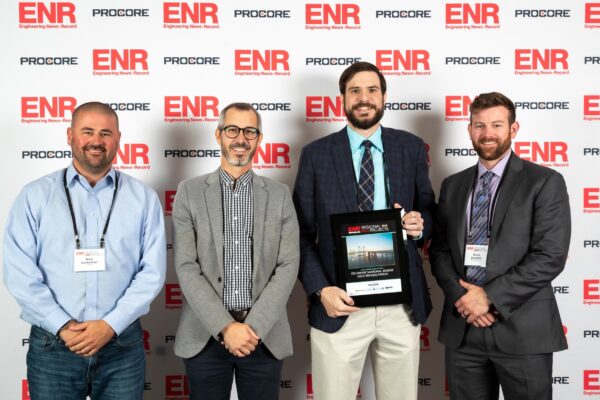The business case for environmentally-friendly facilities

Environmentally-friendly buildings appeal to many of today’s corporations looking to demonstrate their commitment to sustainability. As you embark on your next big development project, it can be advantageous to consider how the type of concrete slab as well as the paving you use can radically reduce your carbon footprint – and save money in the process.
Rethinking Concrete Flooring
Historically, warehouses and manufacturing facilities were built with traditional concrete slabs, a process involving materials which results in high amounts of CO2 emitted into the atmosphere. The manufacture of cement is tough on the environment – emitting roughly 0.9 pounds of C02 into the atmosphere for every pound of cement produced.¹ A batch of concrete is made up of roughly 7-15 percent cement. This means that manufacturing just one cubic yard of concrete results in 400 pounds of CO2 going into the atmosphere.
Installing a DUCTILCRETE® engineered slab significantly reduces your environmental impact in a number of ways.
Reducing the floor profile cuts the amount of cement used. DUCTILCRETE® engineered slabs typically only require a 6” slab, compared to a conventionally-designed 7” concrete slab. Using a DUCTILCRETE® system for a one million square foot warehouse could potentially eliminate the release of roughly 1.2 million pounds of CO2 into the atmosphere. A reduction in profile thickness also results in less aggregate used in the concrete and fewer trucks (i.e., less fuel consumed) to deliver concrete to the jobsite.
| Concrete | Slab Thickness (in) | Concrete Volume (cyd) | Cement Factor (lb/cyd) | Cement Consumption (Million lbs) |
Approximate Carbon Footprint (CO2 lb/cyd)* |
Total CO2 (Million lbs.) |
| Conventional System | 7 | 21,605 | 550 | 12 | 400 | 8.6 |
| DUCTILCRETE® System | 6 | 18,518 | 10.2 | 7.4 | ||
| Difference | 1 | 3,086 | 1.8 | 1.2 |
Replacing steel reinforcement with macro fibers. DUCTILCRETE® engineered slabs use macro-synthetic fibers to strengthen the concrete as opposed to traditional reinforced steel. This is another way to lessen the environmental impact of the floor.
A recent study by the University of Akron in Ohio compared the use of fiber reinforced concrete with conventional steel rebar. The researchers considered numerous elements, including the manufacturing, production, transportation and installation processes of both systems into their lifecycle analysis. They assessed the carbon footprint of a 150,000 ft2 concrete floor using macro-synthetic fibers instead of traditional rebar. In this example, the carbon footprint could be reduced by 56 percent for the floor with macro-synthetic fibers.
Using less joint filling material. Since there are far fewer joints and far fewer resulting joint problems with a DUCTILCRETE® engineered slab system, there is much less need for epoxies and other joint filling materials, which may contain harmful chemicals.
The DUCTILCRETE® engineered systems not only drive down CO2 use but their unique design significantly lowers maintenance costs. Traditional concrete slabs are prone to cracking due to control joints and concrete curling. By drastically reducing the number of control joints and utilizing a system that reduces the potential for curling, DUCTILCRETE® engineered slabs remain flat, and easier to maintain.
Replacing Asphalt
Conventional asphalt paving comes with many environmental challenges. Black asphalt absorbs light and emits large amounts of heat. This exacerbates the “heat island” effect in urban areas, degrading air quality and causing excess energy use. DUCTILCRETE® engineered paving systems blend proprietary liquid admixtures, synthetic fibers and placement practices to reduce this heat absorption.
In fact, DUCTILCRETE® engineered paving systems improve light reflectivity so much that they can actually reduce the amount of lighting required in parking lots and similar structures. In addition, unlike traditional asphalt, which contains volatile organic compounds and oils that can leach into the air and can also contaminate nearby aquifers during rainstorms, DUCTILCRETE® engineered paving systems have no such chemicals.





